- Home
- Priscilla Royal
A Killing Season mm-8
A Killing Season mm-8 Read online
A Killing Season
( Medieval Mystery - 8 )
Priscilla Royal
Priscilla Royal
A Killing Season
To every thing there is a season, and a time to every purpose under the heaven:
A time to be born, and a time to die; a time to plant, and a time to pluck up that which is planted;
A time to kill, and a time to heal…
— Ecclesiastes 3:1–3 (King James Version)
Chapter One
The travelers and their armed escort halted near the cliff’s edge. Far below them, the moss-green sea lashed the black rocks and roared with the fury of a creature enraged beyond all reason.
Brother Thomas grimaced, his face stinging from the wind as if the air had been filled with ice shards. Even his thick woolen cloak did not protect him from the chill, and his horse shook, eager to be away from this inhospitable place. Whispering promises of imminent relief in a warm stable with dry straw, the monk stroked her bristled neck and silently prayed that his confidence would not prove false.
Out of the corner of his eye, Thomas glimpsed a well-bundled, square-shaped rider edging closer to him on an equally thickset horse. It was Master Gamel, the physician.
“What has caused this delay?” the man shouted. The screaming wind and thundering surf muted his words.
The monk pointed toward the front of the huddled company.
A single horseman separated himself from the others and rode slowly into the swirling grey mist. Within moments he had faded from sight.
“Sir Hugh just left to announce our arrival,” Thomas yelled back to the physician. “The fortress is on an island, and we cannot enter until the soldiers lower the drawbridge over the chasm.”
Squinting, Gamel peered ahead. “I see no island. Neither can I see Sir Hugh.” Nervously, he laughed. “Were I not in the safe company of Prioress Eleanor, Sister Anne and you, I might conclude that we had arrived at the mouth of Hell. This thunderous noise must be little different from the howling of damned souls.”
After Father Eliduc’s visit to Tyndal last summer, Thomas was not as inclined to believe that those vowed to God’s service offered protection from evil, but the physician knew nothing of those events. The monk replied with a comforting smile.
Master Gamel’s horse inched nearer to Thomas’ mount, seeking a fellow creature’s warmth. The physician took advantage of this to incline his head and say, in a tone as discreet as the crashing sea would permit, “I would not have troubled you with my questioning had my true concern not been for the welfare of Sister Anne.”
Alarmed, the monk straightened and looked over the physician’s shoulder.
Seated on a docile mare just a few feet away, the sub-infirmarian of Tyndal Priory bent almost double against the wind’s assault. Although her face was obscured by the hood of a cloak, her posture expressed great suffering from the bitter cold.
“A man must endure these circumstances,” Gamel continued. “Women are tender creatures. As a physician, I am obliged to warn you that she might suffer a deadly chill if she remains here much longer.” Suddenly his cheeks flushed, perhaps more than the wind had provoked. “I offered my extra blanket, and she refused.” His fingers twitched as they played with the loose ends of the reins. “I swear I meant no offence to her virtue. The blanket may have warmed me often enough, but surely the intended charity washed the wool clean of my touch, sinful mortal that I am.”
“God knows when a man’s heart is pure,” Thomas replied as he noticed the physician’s reddened face. His acquaintance with this Master Gamel had been short, but he had no cause to conclude he was anything except the worthy man his reputation suggested.
Without doubt he was a physician who took his oaths seriously. Why else would he have left his warm hearth in London, at Sir Hugh’s request, and journeyed to this storm-blasted, decidedly eerie castle in the midst of the winter season? And despite the significant amount of time the man spent riding at Sister Anne’s side, the monk did believe that Gamel’s offer of a blanket was rooted in nothing more than charity.
Had she not been a nun, some might have concluded that the pair had found a delight in each other that exceeded the pleasure of a traveling companionship. Yet Thomas had no doubts about Sister Anne’s virtue or her good understanding of a man’s ways. The woman might be vowed to God, but she had also been a wife, mother, and a well-regarded apothecary before she left the secular world in her third decade to heal the sick in God’s name.
She was quite capable of dealing firmly with Master Gamel if he had done or said anything against propriety. And if the physician’s conduct went beyond her ability to correct, she would have told both Thomas and Prioress Eleanor. She had not done so. He himself had ridden close to the pair for most of the journey and noted only the routine of innocent conversation. Although appearances could belie the truth, the monk thought all had been seemly between nun and physician.
Gamel twisted around in his saddle to look at the nun. “My fears for her health grow, Brother.”
A wind surge struck them with force. The horses whinnied nervously. The whites of their eyes showed fear.
“This weather will surely kill the good woman!” Extending his hand in supplication, Gamel shouted: “Would she accept something from you that she dare not from me?”
“I shall speak with her,” the monk replied. With some effort, he urged his horse away from the warming flank of the physician’s mount.
As he approached the nun, Sister Anne raised her head with evident reluctance. Her eyes narrowed in the icy air. “Have I caused some difficulty?”
“If my hands and feet have grown numb, yours must have too.”
“And Master Gamel cannot understand why I rejected his offer to wrap me in a blanket.” Her mouth was hidden, but small wrinkles at the corners of her eyes deepened with gentle amusement.
Thomas chuckled. “Since I would have welcomed it, I wonder myself!”
Another malevolent burst of wind slashed at them, forcing the pair to turn their backs against it and curl inward to conserve body heat.
“My mother bore me during a North Sea gale, Brother,” the nun shouted. “This woman’s skin has been hardened by long exposure to these storms. You and Master Gamel are London men and own far more tender flesh.” She straightened and urged her reluctant mount to turn around.
Teeth gritted, Thomas tried to grin. “How many years must I reside on the East Anglian coast before my soft youth be forgotten?”
“Never, I fear.” Her kind eyes softened the retort.
He nodded. “Master Gamel has cause for concern. Your face is very white, and you have taught me…”
She touched her cheek. “I can feel my fingers…” Suddenly, she pointed to the thick mist. “Is Sir Hugh returning?”
At the front of the company, a tall rider drew up next to a tiny figure.
Thomas strained to see. “He is speaking with Prioress Eleanor.”
The knight raised his hand and gestured for the travelers to follow him.
“We shall have the relief of hearth fires before long,” Anne said, then directed her horse toward the waiting Master Gamel.
Struck with vague apprehension, Thomas hesitated and patted his mare’s neck as he watched the nun and physician ride off together.
His mount sensed the journey’s end had finally come and snorted, indicating impatience with this unwarranted lingering.
Thomas smiled. “Did I not promise you a warm stall and a good meal to follow?” he whispered. When her ears flicked, he signified agreement with her desire and let her join the other horses on the road to comfort.
***
The party moved slowly, no more than two abreast. The
path to the castle gate was narrow, just wide enough in places for one supply wagon to pass.
A few horses danced nervously in the howling wind.
Grateful that his mare was focused on what awaited her within the castle walls, Thomas forced himself to emulate her lack of interest in what lay below them, although he was quite aware of the jagged drop to the sea on either side. Where the road dipped, he felt the rising spray from the waves as they attacked the rocks like a besieging army, intent on destroying fortress walls.
Uncomfortably reminded of the collapsing walls at Jericho, he shut his eyes and tried to imagine a more pleasing event. The Play of Daniel, a liturgical drama recently performed at Tyndal, came to mind. That memory of sweet singing distracted him briefly.
Then the road inclined upward again, and the ground beneath him felt more solid. Closer now, he soon made out the castle itself. The outer curtain walls were as circular as the rocky terrain would allow. The keep within, black with damp, soared into the high mist.
He shivered.
The place was fearsome. Some, he had heard say, called the fortress le château doux et dur. Perhaps it was sweet in the softer seasons when breezes caressed men with the warm scent of wildflowers. Now, the castle loomed like Satan’s shadow: gloomy, impenetrable, threatening.
As the party approached the open gate, Thomas saw the lowered drawbridge that spanned the void between mainland and island. “The sea has won one battle here,” he muttered and squeezed his eyes shut.
When his horse walked onto the wooden planking of the drawbridge, her hooves made a hollow sound. To keep from thinking about the abyss beneath, Thomas opened his eyes and stared at the high walls of the keep which rested on the firm earth inside. He looked up at the higher windows and concluded that was where Baron Herbert’s family must live.
Then he saw a dark figure leaning out of one of them.
Thomas instinctively tensed with apprehension.
The figure bent forward, spread his arms like wings, then slid, headfirst, from the window.
Crying out, Thomas covered his eyes with a hand.
The man’s scream cut like a knife through the roar of the sea and wailing wind.
Chapter Two
Prioress Eleanor clutched her mazer of sweet mulled wine closer to her chest. If only her hands would stop shaking from the cold, she thought and bent her head forward to sip.
Standing on the other side of the Great Hall hearth, Sir Hugh stared into the leaping flames, lost in thought as if pondering the nature of fire. A burning log cracked, scattering bright sparks around his feet. The prioress’ brother did not flinch.
A grey-bearded servant scuffled toward them, paused at a respectful distance, and bowed.
Eleanor glanced at Hugh but he seemed oblivious to the man’s presence. “We desire nothing more,” she said.
The servant’s eyes brightened as if grateful for the dismissal. Bowing again, he departed. The bottom of his shoes grazed the rushes as if he did not have the strength to step higher.
Slowly, the fire’s warmth began to penetrate into her bones. Eleanor relaxed her tight grip on the mazer and studied the profile of her silent brother. Hugh had changed since he sailed for Outremer with Lord Edward. Although he bore few observable battle scars, the once pink-faced lad, possessed of irrepressible enthusiasm, was now a hollow-cheeked man with changeable moods.
She shut her eyes. When he first retuned, she heard him tell entertaining stories about his journey home from Acre, tales that provoked much laughter and not a little awe at table. Then she had looked into his eyes and saw a soul draped in mourning.
Footsteps from the outer corridor shattered the musings of both brother and sister.
A lean young man strode through the doorway.
Sir Hugh blinked, then offered a fleeting smile.
There is less warmth and more caution in that look, Eleanor noted, before turning to greet the arrival.
“I came to beg forgiveness for our rude greeting.” The youth bowed to the prioress and ignored the knight. “I am Raoul, youngest son of Baron Herbert.” He shrugged. “Or perhaps I should say youngest but advancing in rank with unseemly speed.”
“The Prioress of Tyndal.” Hugh gestured with courtesy toward his sister, and then hesitated with evident confusion. “I am Hugh of Wynethorpe, a friend of your father. He and I were close companions in Outremer.”
Raoul responded with a barely civil nod before turning his attention back to Eleanor. “I speak for all my family in welcoming you here. Your prayers on our behalf are sorely needed.”
“We are much grieved by the unfortunate accident. The man who fell…” Hugh spread his hands.
“Gervase? He had become the heir to our father’s fortune, the second son of five. To his parents’ grief, he learned today that God did not intend for him to fly.” Raoul scratched at some faint bristles on his chin. His expression shifted between amusement and unease. “The current heir, Umfrey, has now locked himself in the family chapel. I think he would have been happy enough to become the family’s oblate to the Church. To his grief, that role falls to me while my prayerful brother shall be obliged to learn how to wield a sword.” His tone was jesting, his look impudent. “Perhaps your timely arrival means I am destined to find a monk’s cell at Tyndal Priory.”
Eleanor swallowed a sharp retort. “I shall bring God’s comfort to your father and mother as well as prayers,” she replied, choosing to respond only to the request for her pleas to God. The youth’s demeanor was somewhat impertinent, but grief and shock often produced strange, inappropriate reactions. Some wept at the news of a loved one’s death, others might laugh, but this was the first time she had met a man who considered a brother’s horrible death as little more than an inconvenient change in his own vocation.
“I’m told my father is with the corpse. My mother is in her chamber with our cousin, Leonel.” Raoul pointed upward. “The dead one may have been her favorite, or so I have heard. I am amazed that you cannot hear her wailing.” He shrugged. “Leonel will have found a way to comfort her. He could soothe a soul on the way to Hell.”
Raoul might be the Benjamin of this family, so young that his beard was more promise than fact, but his words suggested that this youth was never anyone’s favored child. Eleanor felt her annoyance dissipate, and her heart softened a little.
“I remember that Baron Herbert had five sons. You claim that only two remain?” Turning his back on the youngest one, Hugh poured himself some wine from a pottery jug and failed to offer Raoul any of it. “’Tis a pity that your mother did not bear a worthy son soon after your father left England.”
The baron’s son flushed. “You said you were close by my lord father’s side, yet you did not hear of his eldest son’s death? I am surprised.”
Eleanor set down her mazer on a nearby table, slipped her hands into her sleeves, and waited for her brother’s response. Raoul may have spoken with mockery, but Hugh had goaded with stinging words.
“Baron Herbert left for home soon after he heard. I stayed longer with King Edward and had little opportunity to offer comfort.”
“Ah, yes!” Raoul’s mouth twisted into a sneer. “Until after the assassination attempt against our king. That I had heard.”
Eleanor grew uneasy. What quarrel lay between these two?
Hugh stiffened. He said nothing, but his expression betrayed a fury that matched the intensity of the wind outside.
As if suddenly aware that he was gravely offending his father’s guest, Raoul stepped back with a sheepish look and continued in a softer voice. “Then you could not have learned that the third eldest brother recently drowned. He was called Roger.” His tone was painstakingly courteous.
Hugh’s was not. “I received word.”
“Which accounts for the honor of your visit?”
“If you were not told of any particular reason why your father may have desired our company, then the fact that he simply wished it should be sufficient for you.”<
br />
With that prickly rebuke, the color in Raoul’s face deepened into burgundy, but he held his tongue.
This sharp exchange between her brother and Baron Herbert’s youngest resounded in her mind like the crashing of lances on shields. This was a house in mourning, she thought, not some tournament. The dispute between these two had gone on too long.
Turning to Raoul, she said, “Your grief over these recent family deaths must be profound, my son. Our visit may be sadly ill-timed, but Brother Thomas and I are here to give what consolation we can. Please tell your mother that I shall visit when she wishes. Brother Thomas awaits your father’s summons.”
Before turning to face the hearth, Hugh unexpectedly gave his sister an appreciative nod.
Raoul bowed to the prioress. “Then I shall leave to convey your kind words. In the meantime, I pray that all comforts have been provided you and your fellow travelers. If not, tell me at once. My father would have no guest lack any desire or need.”
Before Hugh could say a word, Eleanor quickly assured Raoul, on behalf of the entire company, that all was as it should be.
***
The prioress waited until the sound of Raoul’s footsteps had faded down the corridor before walking to her brother’s side.
“Well done, sweet sister!” He grinned and offered wine. “If God be willing and the king need one highly skilled in the art of making peace, I shall mention your talents. To separate two men so hot for battle took courage.”
“Why do you dislike Raoul?”
“On the voyage to Acre, his father told me that his seed must have been too weak when that boy was bred. If the lad was denied some desire, he sniveled like a babe denied the teat. If reprimanded by his father, Raoul whined like a beaten dog and ran off with tail between his legs. Herbert complained that his son seemed incapable of facing adversity like a man must.” He sighed. “As for my own knowledge of the boy, I spent as little time as I could with him during my early visits here. He was too young for companionship, and I cannot recall that he was ever welcome company for anyone.”

 The Twice-Hanged Man
The Twice-Hanged Man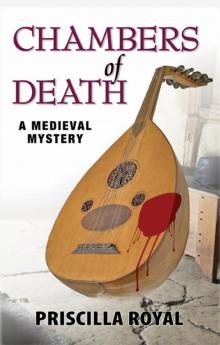 Chambers of Death mm-6
Chambers of Death mm-6 Forsaken Soul
Forsaken Soul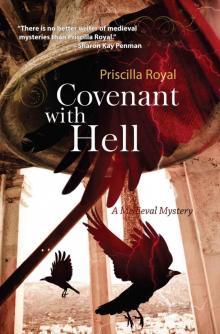 Covenant With Hell (Medieval Mysteries)
Covenant With Hell (Medieval Mysteries)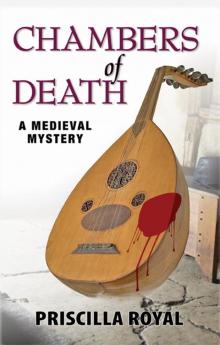 Chambers of Death
Chambers of Death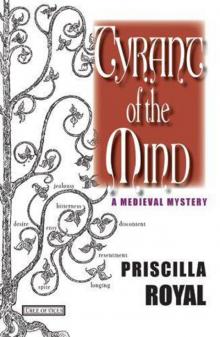 Tyrant of the Mind
Tyrant of the Mind Wild Justice
Wild Justice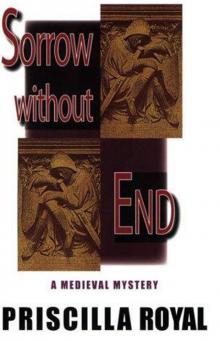 Sorrow Without End
Sorrow Without End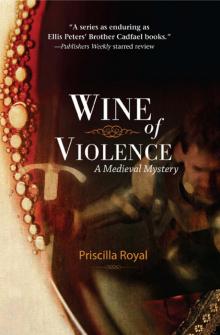 Wine of Violence
Wine of Violence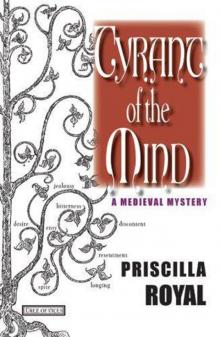 Tyrant of the Mind mm-2
Tyrant of the Mind mm-2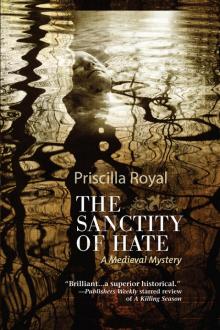 The Sanctity of Hate
The Sanctity of Hate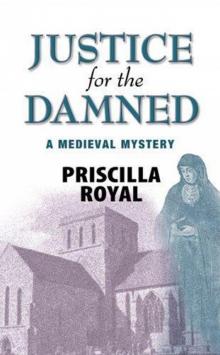 Justice for the Damned
Justice for the Damned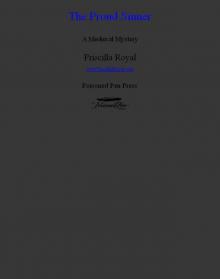 The Proud Sinner
The Proud Sinner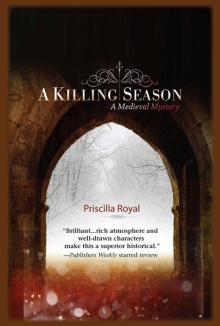 A Killing Season mm-8
A Killing Season mm-8 Forsaken Soul mm-5
Forsaken Soul mm-5 Valley of Dry Bones mm-7
Valley of Dry Bones mm-7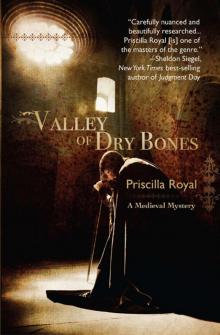 Valley of Dry Bones
Valley of Dry Bones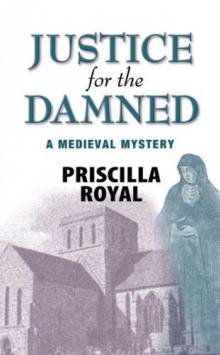 Justice for the Damned mm-4
Justice for the Damned mm-4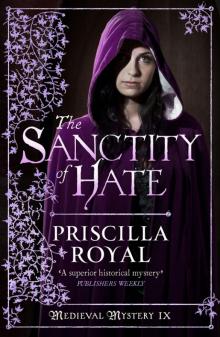 Sanctity of Hate
Sanctity of Hate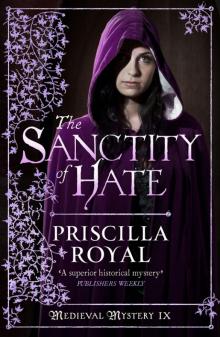 Sanctity of Hate mm-9
Sanctity of Hate mm-9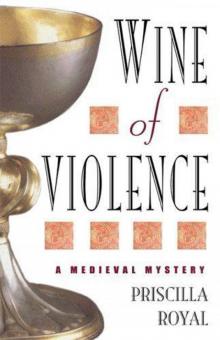 Wine of Violence mm-1
Wine of Violence mm-1